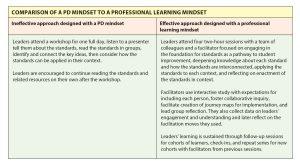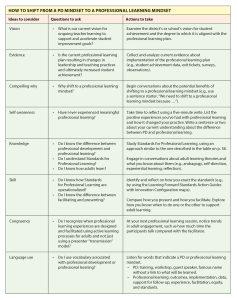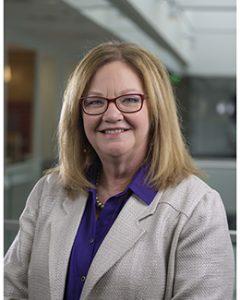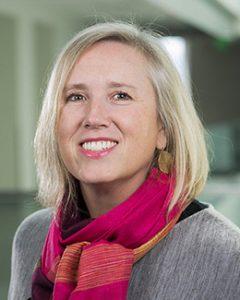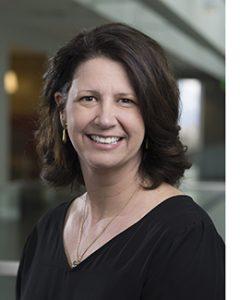IDEAS
Professional learning vs. PD: The distinction matters
By Janice Bradley, Cori Groth, Andrea Rorrer and Leslie Evans
Categories: Change management, Collaboration, Learning designs, Standards for Professional LearningJune 2023
For most professional learning facilitators, this is a familiar scenario: A district invites us to present during a back-to-school professional development day, assigning us to a breakout session slot following a general session keynote address. We work with the educators for a short time — maybe 45 minutes, maybe three hours — and then we never see them again. We hope we’ve made a difference, but we have no way to know for sure.
When this scenario occurs, we recognize that the district’s request is well-intentioned and that educators value the support. But research and experience tell us that these kinds of professional development activities rarely result in desired shifts in educational practice and increases in student achievement because they are disconnected from educators’ day-to-day work and do not provide ways for participants to integrate what they learn into ongoing practice.
Part of the reason many districts fail to achieve the promise of high-quality professional learning is that they operate with what we call a “PD mindset.” This mindset manifests in sporadic, one-time events, inservice sessions, guest speakers, webinars, and workshops that are not part of a larger plan or vision.
Typically, even when they are grounded in research, these activities do not align with school goals, promote educator voice and agency, encourage learning in community, or respond effectively to students’ and teachers’ needs. Ultimately, a PD mindset attempts a quick fix or offers a small dose of content that is not sufficient to stimulate a change in thinking or practice or address systemic issues.
As university partners who collaborate with school districts, we believe that education leaders and learning designers need to shift from this PD mindset to a professional learning mindset, in which professional learning and growth are centered around accelerating personal and collective learning and closing the knowing-doing gap for leaders and teachers. We draw on the work of scholars, researchers, and practitioners who promote evidence-based professional learning practices as described in Standards for Professional Learning (Learning Forward, 2022).
The professional learning mindset is one ''in which professional learning and growth are centered around accelerating personal and collective learning and closing the knowing-doing gap...'' #TheLearningPro #EdAdmin #EdLeaders Share on XShifting mindsets requires reframing the purpose for professional learning and educator support. In part, this shift will include moving from delivering information to intentionally co-designing, with educators, learning and growth opportunities that are grounded in the evidence about what is most needed and most effective.
To make the shift in mindsets, school and district leaders must reconsider how their school vision aligns professional learning with student achievement goals, be clear about their “why,” and engage in critical self-reflection about how their own experiences with professional learning influence current practices.
They must commit to building their own skills, knowledge, and awareness of the components and qualities of effective professional learning so they can foster this growth in others. And finally, they must consider how evidence is used to track implementation and outcomes.
In our work with districts, we have seen that when school and district leaders make the shift in mindset from PD to professional learning, they create and facilitate more effective learning designs, and professional learning becomes more aligned and coherent. The content becomes more relevant, job-embedded, and responsive to students’ and schools’ immediate needs.
Teachers have more regular opportunities to diagnose and respond to student learning needs through approaches like lab classrooms and coaching. Educators begin collaborating to create a shared vision, construct detailed implementation maps, and co-design professional learning plans and feedback systems to monitor their progress.
Ultimately, they make changes to their instructional practices that improve and accelerate student learning. (See blue box below for an example of how one school we worked with made the shift from PD to professional learning.)
Shifting to professional learning is intentional co-design with educators. It is learning and growth opportunities that are grounded in the evidence about what is most needed & effective. #teachertwitter #K12 #ProfDev Share on XHow to make the shift
Shifting from a PD mindset to a professional learning mindset takes an intentional systems approach, where those designing professional learning must consider that the “whole is more than just the sum of its parts” (Koffka, 1963).
Such an approach should draw on the well-established characteristics of effective professional learning, such as having sustained, ongoing structures for collaboration, coaching, and feedback with opportunities for active engagement to learn about specific instructional strategies or curriculum (e.g., Archibald et al., 2011; Darling-Hammond et al., 2017; Garet et al., 2001).
Recent research shows that professional learning aligned with these characteristics and other elements of Standards for Professional Learning is associated with improved teacher instruction, leading to increased student achievement (Foster, 2022; Learning Forward, 2022, Garrett et al., 2021; Labone & Long, 2016; LeFevre et al., 2019).
Standards for Professional Learning provide a framework for shifting from a PD mindset to a professional learning mindset by emphasizing interrelationships among the conditions, processes, and content rather than seeing professional learning as a series of stand-alone, isolated activities.
To understand and apply the standards, leaders at the state, district, and school levels must experience them, not just intellectualize or listen to others talk about them. They must have opportunities to engage in meaningful professional learning that embodies and models the standards. To illustrate what this does and doesn’t look like, the table above compares two professional learning designs for examining the standards — one effective and one ineffective.
Shifting from a PD mindset to a professional learning mindset takes time, intentionality, and an investment in learning. We recommend that leaders aiming to facilitate this shift focus on the following components:
- Establish a shared vision of professional learning;
- Review evidence of current professional learning approaches;
- Identify a compelling “why” for professional learning;
- Develop self-awareness about professional learning experiences and perceptions;
- Examine knowledge about high-quality professional learning, including Standards for Professional Learning;
- Cultivate skills in facilitating standards-aligned professional learning;
- Identify active learning processes to engage adult learners; and
- Encourage language that focuses on learning and improvement and discourage language about training and workshops.
See table below (or click on the pdf at the end of this article to see a larger version) to explore each of these components, including questions to pose and actions to take.
Foster cultures of learning
When leaders shift their mindsets from “professional development” or “PD” to “professional learning” and use Standards of Professional Learning as a guiding framework, they are better positioned to foster powerful professional cultures of learning.
As their own learning is accelerated, they are better equipped to support teacher capacity building, which is the first step toward cultivating a culture of practice where educators are actively engaged in and set the course for their own professional learning.
In this way, educators and leaders can make sustained changes in practice that have meaningful impacts on their students’ learning and lives.
PD or professional learning? Check the language. PD = training, workshop, or guest speaker. Professional learning = outcomes, implementation, data, facilitation, equity, & standards. #EduTips #ProfDev #Stand4PL Share on XDownload pdf here.
How one school shifted to a professional learning mindset
Student achievement at Riverglen Elementary (a pseudonym) was in the bottom 10% of the state. When none of the 5th-grade students achieved proficiency in writing on the state assessment, school leaders knew they needed to do something differently.
They recognized that improving student writing proficiency meant setting shared goals and building teachers’ instructional capacity vertically in grades K-5. In August, the literacy coach, with principal support, introduced the faculty to several research-based writing strategies.
However, in January, students’ writing scores hadn’t increased. School leaders realized that teachers were not consistently implementing the new strategies, so they reached out to our university-based center for help with implementation.
We worked with Riverglen leaders to use a professional learning approach grounded in Learning Forward’s Standards for Professional Learning. In this process, teachers and school leaders developed a shared vision for how they would collaborate in professional learning communities, planned collaboratively for implementation of the writing strategies supported by coaching, engaged in ongoing feedback cycles, participated in lab class learning designs, and used student learning data to ensure effective implementation and continuous improvement of instructional practices.
Three years later, teachers were implementing the strategies more effectively, and an impressive 83% of 5th graders were proficient in writing. The principal attributed students’ success to leaders and teachers developing a professional learning mindset and understanding how the standards could be enacted to result in student learning gains.
References
Archibald, S., Coggshall, J.G., Croft, A., & Goe, L. (2011). High-quality professional development for all teachers: Effectively allocating resources. National Comprehensive Center for Teacher Quality.
Darling-Hammond, L., Hyler, M.E., & Gardner, M. (2017). Effective teacher professional development. Learning Policy Institute.
Foster, E. (2022). Standards for Professional Learning: The research. Learning Forward.
Garet, M.S., Porter, A.C., Desimone, L., Birman, B.F., & Yoon, K. S. (2001). What makes professional development effective? Results from a national sample of teachers. American Educational Research Journal, 38(4), 915-945. doi-org.ezproxy.lib.utah.edu/10.3102/00028312038004915
Garrett, R., Zhang, Q., Citkowicz, M., & Burr, L. (2021). How Learning Forward’s Standards for Professional Learning are associated with teacher instruction and student achievement: A meta-analysis. Center on Great Teachers and Leaders at the American Institutes for Research.
Koffka, K. (1963). Principles of Gestalt psychology. Harcourt, Brace & World.
Labone, E. & Long, J. (2016). Features of effective professional learning: A case study of the implementation of a system-based professional learning model. Professional Development in Education, 42(1), 54-77.
Learning Forward. (2022). Standards for Professional Learning. Author.
LeFevre, D., Timperley, H., Twyford, K., & Ell, F. (2019). Leading powerful professional learning: Responding to complexity with adaptive expertise. Corwin.
Categories: Change management, Collaboration, Learning designs, Standards for Professional Learning
Recent Issues
WHERE TECHNOLOGY CAN TAKE US
April 2024
Technology is both a topic and a tool for professional learning. This...
EVALUATING PROFESSIONAL LEARNING
February 2024
How do you know your professional learning is working? This issue digs...
TAKING THE NEXT STEP
December 2023
Professional learning can open up new roles and challenges and help...
REACHING ALL LEARNERS
October 2023
Both special education and general education teachers need support to help...


